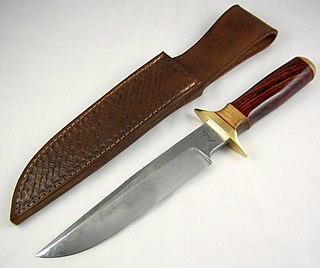
A knife is a tool or weapon with a cutting edge or blade, usually attached to a handle or hilt. One of the earliest tools used by humanity, knives appeared at least 2.5 million years ago, as evidenced by the Oldowan tools. Originally made of wood, bone, and stone, over the centuries, in step with improvements in both metallurgy and manufacturing, knife blades have been made from copper, bronze, iron, steel, ceramic, and titanium. Most modern knives have either fixed or folding blades; blade patterns and styles vary by maker and country of origin.
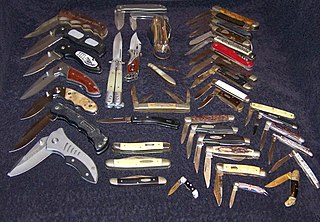
A pocketknife is a knife with one or more blades that fold into the handle. They are also known as jackknives (jack-knife), folding knives, EDC knife, or may be referred to as a penknife, though a penknife may also be a specific kind of pocketknife. A typical blade length is 5 to 15 centimetres.

The Camillus Cutlery Company is one of the oldest knife manufacturers in the United States. The Company was founded in 1876 and produced millions of knives until it filed for bankruptcy in 2007. Its brand name and intellectual property rights were purchased by Acme United Corporation, which re-launched the Camillus brand in May 2009 using modern materials.

Buck Knives is an American knife manufacturer founded in Mountain Home, Idaho and now located in Post Falls, Idaho. The company has a long history through five generations of the Buck family from 1902 to the present day. Buck Knives primarily manufactures sport and field knives and is credited with inventing the "folding hunting knife" and popularizing it to such a degree that the term "buck knife" has become synonymous with folding lockback knives, including those made by other manufacturers.
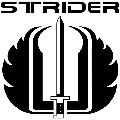
Strider Knives, Inc. is a custom and production knifemaking facility headed by Mick Strider founded and based in San Marcos, California.
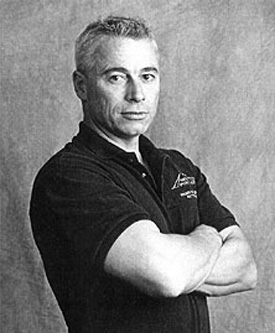
Ernest R. Emerson is an American custom knifemaker, martial artist, and edged-weapons expert. Originally an engineer and machinist in the aerospace industry, Emerson became a knifemaker by producing knives for a martial arts class and making art knives early in his knifemaking career. In the 1980s he became better known for his combat knives and popularizing a style of knife known as the Tactical-folder.
Robert Waldorf Loveless, a.k.a. Bob Loveless or RW Loveless, was an American knife maker who designed and popularized the hollowground drop point blade and the use of full tapered tangs and screw-type handle scale fasteners within the art of knifemaking. He is cited by other knifemakers and collectors as one of the most innovative custom knife makers in the world.

Ken Onion is an American custom knifemaker based in Kaneohe, Hawaii, United States who invented the "SpeedSafe" assisted opening mechanism for Kershaw Knives. Ken Onion was the Premier Knife Designer for Kershaw Knives.

The Linerlock is a locking mechanism for folding pocket knives. A Linerlock is a folding knife with a side-spring lock that can be opened and closed with one hand without repositioning the knife in the hand. The lock is self-adjusting for wear. The modern Linerlock traces its lineage to the late 19th century, but in the 1980s the design was improved by American custom knifemaker Michael Walker.
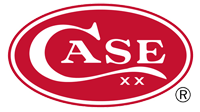
W.R. Case & Sons Cutlery Company is an American manufacturer of traditional pocket knives, fixed blades/sporting knives, kitchen knives, limited edition commemoratives and collectibles. The company originated in Little Valley, New York, around the turn of the 20th century, before relocating to its current home, Bradford, Pennsylvania, in 1905. The company's namesake, William Russell Case, first made knives with his brothers under the name Case Brothers Cutlery Company. His son, John Russell ("Russ") Case, worked as a salesman for his father's company before founding W.R. Case & Sons.

The Sebenza is a folding pocket knife manufactured by Chris Reeve Knives of Boise, Idaho. It is constructed with a stainless steel blade and titanium handle. Its handle functions as the lock mechanism similar in concept to the Walker linerlock differing in that the handle itself forms the lock bar which holds the blade open. This mechanism was invented by Chris Reeve, and is called the Reeve Integral Lock (R.I.L). It is also commonly referred to as the Framelock, and is one of the most widely implemented locking systems in the folding knife industry, where lock strength and reliability is a product requirement. The name Sebenza is derived from the Zulu word meaning "Work," a tribute to Mr. Reeve's South African origins.

The Umnumzaan is a folding pocket knife manufactured by Chris Reeve Knives of Boise, Idaho, and designed by Chris Reeve. The name "Umnumzaan" is derived from the Zulu language, meaning "Head of the family," or "Boss" (colloq.), a tribute to Mr. Reeve's South Africa origins. The Umnumzaan was designed to meet the needs of operators seeking a heavy-duty folder capable of handling heavy use and even abuse. Building upon the Sebenza’s success, the Umnumzaan features: a stronger pivot joint, a thicker blade, a different blade grind with a reinforced tip, improved ergonomics, thicker titanium handles, a thicker titanium lock bar, a stronger ceramic ball detent system, a larger titanium spacer, a phosphor-bronze washer system designed to act as a ‘dry-sump’ to retain lubrication and keep dirt out, an oversized ambidextrous-thumb studs & extended lock bar to aid operation when wearing gloves, a lanyard pivot joint that uses pivoting lanyard tie bars, and a deeply textured grip.
Chris Reeve Knives is an American knife manufacturing corporation with international sales and distribution headquartered in Boise, Idaho, that designs, develops, and sells folding pocket knives and fixed-blade knives. Its products include the Sebenza, Inkosi, Umnumzaan, TiLock, Mnandi folding knives, Impinda slip joint, and the Green Beret, Pacific, Professional Soldier, Nyala, and Sikayo fixed blade knives. Chris Reeve Knives' industry contributions include the Integral Lock, contributions to the blade steels CPM-S30V and CPM-S35VN, and has won Blade Magazine's Blade Show Manufacturing Quality Award 15 times. Their motto is Think Twice, Cut Once.

Columbia River Knife & Tool, Inc. (CRKT) is an American knife company established in 1994, and currently based in Tualatin, Oregon, United States. The company's president and sales executive is Rod Bremer and the finance executive is Peggy Bremer.

The CQC-6 or Viper Six is a handmade tactical folding knife with a tantō blade manufactured by knifemaker Ernest Emerson. Although initially reported as the sixth design in an evolution of fighting knives and the first model in the lineup of Emerson's Specwar Custom Knives, Emerson later revealed that the knife was named for SEAL Team Six. It has a chisel-ground blade of ATS-34 or 154CM stainless steel and a handle made of titanium and linen micarta. The CQC-6 is credited as the knife that popularized the concept of the tactical folding knife.
Emerson Knives, Inc. is an American company that produces knives and related products. It was founded in 1996 by custom knifemaker Ernest Emerson in an effort to mass-produce his folding knife designs for the U.S. Military and collector markets.
Gil Hibben is an American custom knifemaker from Wyoming who is based in La Grange, Kentucky. Hibben designed the first line of Browning hunting knives in 1968, the American Kenpo Knife for Ed Parker, and the Rambo Knife for the 1988 film Rambo III 2008 film Rambo. Hibben's "Fantasy Knives" have been used in over 37 films and television shows, particularly science fiction, earning him the title "Klingon Armorer" from the Star Trek franchise. Hibben currently serves as a President of the Knifemakers' Guild, a post he has held for fourteen years.

Michael Leon Walker is an American custom knifemaker and sculptor based in Taos, New Mexico. Walker is the inventor of more than 20 different knife mechanisms including the Walker Linerlock for which he secured a trademark in 1980.

A fighting knife has a blade designed to most effectively inflict injury in close-quarters physical confrontations. The combat knife and the trench knife are examples of military fighting knives.
Robert G. Terzuola is an American knife maker who popularized the type of knife known as the tactical folding knife.
















